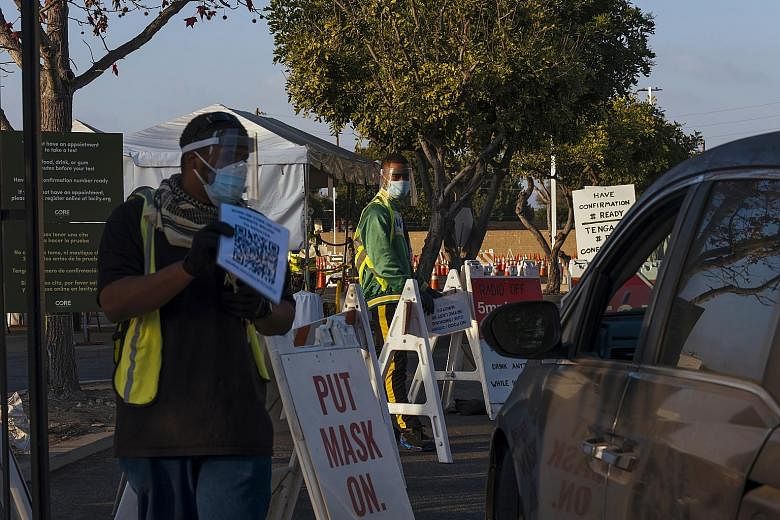BERLIN/WASHINGTON • As the United States and Mexico became the latest countries to authorise the use of Pfizer's Covid-19 vaccine, the chief executive of Germany's BioNTech said the biggest challenge facing the company and its partner Pfizer is to scale up manufacturing to meet huge demand.
"We need to solve the manufacturing challenge," Dr Ugur Sahin told Reuters in an interview. "It is very clear that more doses are needed. And we are dealing with that question - how to produce more doses."
The companies have said they will produce up to 1.3 billion doses of the vaccine next year.
The US Food and Drug Administration (FDA) on Friday authorised the vaccine for emergency use, after Britain became the first country to begin deploying the shot outside of clinical trials earlier in the week.
Dr Sahin said he expects the companies to receive conditional approval from the European Medicines Agency by the end of the month and can begin rolling out vaccine in European countries early next year.
One way he hopes to boost supply would be by bringing on earlier than projected the 750 million-dose-a-year plant BioNTech bought from Novartis in Marburg, Germany. BioNTech had said it would begin making the vaccine there in the first half of 2021, and Dr Sahin said they are working to get it up and running on an expedited timeline.
"The baseline plan is 1.3 billion doses," he said. "And we are working on an extended plan. I can't tell you at the moment what is possible and how much we can expand the scale but we will try to do it significantly."
Supply of the vaccine will be limited at first in the United States, which has a population of roughly 330 million.
The FDA said healthcare workers and elderly people in long-term care facilities are expected to be the main recipients of a first round of 2.9 million doses this month.
The US health authorities, shipping services, hospitals and pharmacies have been readying a nationwide inoculation campaign.
Pfizer said it would start shipping immediately and state public health systems have been planning to begin shots as early as tomorrow.
-
What next on US distribution plans?
-
WASHINGTON • The United States Food and Drug Administration authorised the first Covid-19 vaccine developed by Pfizer and BioNTech, making it available for emergency use to patients aged 16 and older.
The following is an outline of vaccine distribution plans.
WHAT HAPPENS NEXT?
The federal government plans to release the nation's first 2.9 million doses within days of the authorisation to 64 states, US territories and major cities, as well as five federal agencies. Although it is coordinating distribution efforts, states have the final decision over who gets the first shots. The federal government is sending the first shipments to more than 600 locations.
WHO IS FIRST IN LINE FOR A SHOT?
States are prioritising healthcare workers and elderly long-term care residents for the first vaccinations. There are about 21 million healthcare workers in the US and three million nursing home residents.
Most states anticipate they will be able to vaccinate only between 13 per cent and 18 per cent of their healthcare workers with the first distribution, a Reuters analysis found. The federal government has said it will continue to send out millions of doses each week but has not released exact figures.
WHO IS NEXT IN LINE?
States have broad discretion over who will get the vaccine next. So far, a panel advising the Centres for Disease Control and Prevention (CDC) has only issued the guidance that healthcare workers and nursing home residents should be first.
The CDC has laid out a possible framework of three distribution phases, suggesting essential workers and people aged 65 and older as the next priority.
Pfizer has said it would make 50 million doses this year - enough to inoculate 25 million people - about half of which would go to the US. It has an agreement with the US government to supply a total of 100 million doses, enough for 50 million people to be vaccinated.
REUTERS
The government plans to accelerate vaccinations in the coming weeks and months, especially if a second vaccine from Moderna is quickly approved.
The US has ordered 100 million doses of the two-dose vaccine and could negotiate for more.
Mexico, Bahrain and Saudi Arabia have also approved the Pfizer vaccine. Mexico had procured 34.4 million doses of the Pfizer vaccines, with the first batch expected to arrive this month. The country has the world's fourth largest caseload with more than 113,000 deaths and 1.22 million cases as of Friday.
The government said it would begin inoculating its population at the end of the month, with priority given to frontline medical staff.
In data released this week, Pfizer and BioNTech said their vaccine began conferring some protection to recipients even before they got the second shot. It seemed to begin to show some efficacy around 12 days after the first shot.
Dr Sahin said he was surprised by the data: "We know that the immune response is heavily boosted after the second dose."
He said the companies have not decided yet whether to evaluate a single-dose version of the vaccine.
"This will be a discussion that we will certainly have with our partners Pfizer," he said.
REUTERS, AGENCE FRANCE-PRESSE, BLOOMBERG











